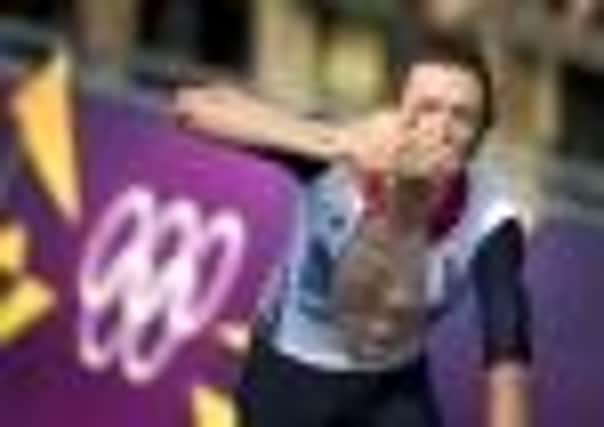London 2012 Olympics: Bradley Wiggins becomes Britain’s most decorated Olympian with historic gold


• Bradley Wiggins wins men’s cycling time trial
• Chris Froome claims bronze in 44km event
And so, as he sat there exhausted, he was the picture of a man who had been denied a medal of any colour rather than one who had just won gold.


With defending champion Fabien Cancellara still out on the course, the Englishman was taking nothing for granted. Nor was the crowd, estimated at around 300,000, who lined the 44-kilometre course, which began and ended at Hampton Court.
Advertisement
Hide AdAdvertisement
Hide AdBut Cancellara, nursing a shoulder injury from a crash during Saturday’s road race, was nowhere close to denying Wiggins another historic triumph. He was applauded across the finish line, and only then was the news official.
Wiggins had won, giving a team which had been starved of success for the first four days its second gold in a matter of hours, following the rowing victory at noon for Heather Stanning and Helen Glover. The hushed expectation gave way to chants of “Wiggo! Wiggo!” and the man with the most famous sideburns in sport could at last celebrate becoming the Briton with the most Olympic medals in history.
Coming at any time, the 32-year-old’s triumph would have been remarkable. Coming less than a fortnight after he won the Tour de France – the first British cyclist to do so – it was simply astonishing.
He had been the favourite, all right, but had we not just spent four days watching British favourites fail to justify their status? And among those
favourites was Mark Cavendish, who had been earmarked to win the first home gold on the opening day of the Games, in the road race in which Wiggins was a member of the team whose aim was to manoeuvre the Manxman into pole position for the closing sprint.
So there were doubts, all right, no matter that the rowers had eased our anxieties earlier. After all, even the greatest athletes need a break from time to time, especially those who have just cycled a few thousand kilometres through France.
But Wiggins had not lost a time trial all year, and he was not going to start now. Judging his race perfectly, he never looked in trouble, and came home in 59mins 39.54sec – more than 40
seconds ahead of the next best rider, Tony Martin of Germany. Chris Froome, the runner-up on the tour and such a vital Team Sky colleague, had to make do with third this time, 25 seconds slower than Martin.
Advertisement
Hide AdAdvertisement
Hide Ad“I cannot put it into words,” said Wiggins. “I wouldn’t do it justice. It was really incredible. To win an Olympic gold in your home city.
“When you win in the velodrome, there are three or four thousand people cheering. Here, around the streets of London, the noise is just amazing. I don’t think anything will top that. I’ve just won the Tour de France. It’s just been phenomenal.”
Yesterday’s victory means that Wiggins has overtaken Sir Steve Redgrave’s total of six medals – five golds and a silver – won in rowing between 1984 and 2000. His total of seven comprises a bronze from Sydney in 2000, a full set from Athens four years later, and two golds in 2008 in addition to the one
secured here.
The debate will rage about what that actually means, and whether Wiggins is now our greatest Olympian, just as it did a day earlier after Michael Phelps overtook Larisa Latynina’s overall record of 18 medals. Does quantity equate to quality?
Or does the fact that Redgrave won more golds mean he is still the best Briton to have graced the Games? And what about Sir Chris Hoy, whose achievement of three golds at a single Olympics still arguably surpasses what Wiggins has achieved – at least purely in the context of the Games, and not taking the small matter of the Tour de France into account?
“It’s not so important that you have seven medals if they’re not the right colour,” was Wiggins’s own contribution to the debate last night. “The main number is four. It was important that it was number four. I’ve got to carry on to Rio [for the 2016 Games] and go for five. Just to be mentioned in the same breath as Redgrave is an absolute honour, with Chris Hoy. To be up there with those guys is very special.”
There will never be a definitive
answer to the debate, and perhaps no point in seeking one. What we do know is that, over a few weeks of one
rain-soaked summer in the early 21st century, Wiggins reigned supreme in the kingdom of cycling.
Advertisement
Hide AdAdvertisement
Hide AdNot that he has any kind of wish to lord it over others. At the palace built in the time of Henry VIII, even while sitting on the garish gold and purple chair set up on the podium, Wiggins looked more a man of the people than ever. If you like, far more of a Thomas Cromwell, the commoner who became Henry’s chief minister, than a Tudor monarch. Even so, he still had a word of appreciate for the regal setting. “There is not much better than this setting, with that castle,” he said. “It’s so British, isn’t it? The sun came out. It was just fantastic.” It was indeed. Fantastic, historic, and unforgettable.